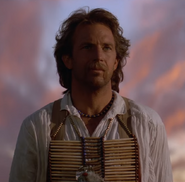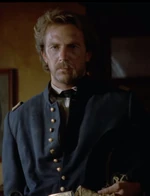
John J. Dunbar (1828-1918), also known as Šuŋgmánitu Tȟáŋka Ób Wačhí ("Dances with Wolves"), was a US Army First Lieutenant who served in the American Civil War before defecting to the Sioux Indians while posted to Fort Sedgwick, Colorado. After a failed suicide attempt at the 1863 Battle of St. David's Field was mistaken as an attempt at inspiring his regiment, he was hailed as a living hero and granted a posting of his choosing, and Dunbar chose to be posted to the American West to see the frontier before it vanished. Dunbar came into contact with the local Lakota tribe after they stole his horse, and, as he was assigned to the remote and unmanned Fort Sedgwick, he was able to establish a rapport with the tribal chief Kicking Bird and a romance with his adoptive daughter Stands with a Fist. Dunbar helped the Lakota repel a Pawnee attack on their camp and came to side with the Lakota when the Army arrived to drive them from their land, ultimately deserting the US military and helping the Lakota escape the US Army.
Biography[]
Civil War service[]
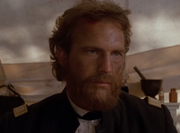
Dunbar in Tennessee, 1863
John Dunbar was born in 1828, and he served in the Union Army during the American Civil War, serving under General Donald Tide in the Western Theater. He was wounded in the foot at the Battle of Stones River, and he grew depressed upon realizing that the surgeons intended to amputate his foot. Dunbar decided to leave the hospital and, after the sharpshooter Sergeant Tom Pepper warned him of the high quality of the Confederate troops encamped across St. David's Field from the Union troops, Dunbar decided to take a US Army horse, Cisco, and suicidally ride across the field, hoping to be shot by the Confederates to avoid having to lose his foot. However, the Confederates missed him the first time he rode past them, while his men cheered him on.

Dunbar talking with Sergeant Pepper
After the Confederates taunted him to make a second pass, Dunbar rode across the field once more, even taking his hands off of the reins and seemingly embracing death. This display of fearlessness inspired his comrades to launch a bayonet charge across the field, driving the Confederates back. Dunbar ultimately fell from his horse, but General Tide approached him and greeted the hero of the day. Dunbar asked Tide to ensure that his foot would not be cut off, and Tide promised that he would send his personal surgeon to tend to Dunbar's wounds without the need for amputation; he also told Dunbar that he was "an officer worth something."
Transfer to the frontier[]

Dunbar arriving at Fort Hays
In spite of the macabre intent of his ride across St. David's Field, Dunbar was hailed as a "living hero" for his supposed bravery, and he was rewarded with a posting of his choosing. Dunbar requested a transfer to the American West so that he could see the frontier before it disappeared, and he was transferred to Fort Hays in Kansas, which was commanded by Major Morris Fambrough.

Dunbar meeting Major Fambrough
Dunbar was then summoned before the eccentric Major Fambrough, who assumed that Dunbar was an "Indian fighter" for wanting to be posted to the frontier, and wondered why a decorated soldier would be stationed away from the fighting. Dunbar explained that his posting was of his own choosing, as he wanted to see the frontier before it was gone. Fambrough was amused, calling Dunbar "sir knight" and assigning him on a "knight's errand": he was to report to Captain Cargill "at the furthermost outpost of the realm", Fort Sedgwick.

Dunbar leaving with Timmons
When Dunbar asked how he would be getting to his posting, Fambrough assumed that Dunbar was insinuating that the Major himself did not know, and he told Dunbar to "hold (his) tongue" and look at the "peasant" outside, the mule-wagon provisioner Robert Timmons (one who knew the way to the fort), and who could take Dunbar to the fort if he wished. Fambrough then dismissed Dunbar, whose salute was returned with a sloppy gesture; as Dunbar left, Fambrough addressed Dunbar, saying, "Sir Knight, I've just pissed in my pants...and nobody can do anything about it." A disturbed Dunbar promptly left, and, as he led his horse away, he heard Fambrough rap at the window with a cup, yelling, "To your journey! To my journey!" As Dunbar left with Timmons, he heard a gunshot from Fambrough's office, as Fambrough had just shot himself.

Dunbar inspecting the ambush site
Timmons took Dunbar and Dunbar's horse - Cisco (whom he had been awarded after the battle) - across the Great Plains, with Dunbar keeping a journal as they went. Timmons proved to be just as awkward as the Major; when the wagon stopped by the site of an ambush and Dunbar inspected an arrow embedded in a skeleton, Timmons chuckled that someone back East was wondering why the man didn't write them. At night, around the campfire, Timmons patted the ground to make a mysterious noise and asked Dunbar what the noise was, attempting to frighten him before cackling at his prank. He then joked to Dunbar, "Put that in your book!" In his journal, Dunbar described Timmons as "quite possibly the foulest man I have ever met."
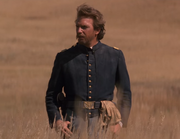
Dunbar looking out across the Great Plains
The two men continued their journey into the Rockies and to Colorado, stopping several times along the way. Dunbar asked Timmons where the buffalo were, but Timmons explained that it was often the case that travellers would not see buffalo for days. Dunbar then asked about Indians, but Timmons joked that they were "nothing but thieves and beggars", and they carried on with their journey.
Arrival at Fort Sedgwick[]
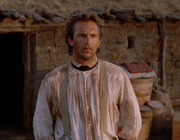
Dunbar at Fort Sedgwick
When the men reached Fort Sedgwick, they found it to be a deserted outpost of just two huts. Timmons decided that they should turn around, but Dunbar insisted that Timmons help him unpack his supplies, as he firmly stated that the fort was his post. Timmons argued with Dunbar until Dunbar cocked his revolver at him and forced him to stick to the plan. After unloading all of his supplies, Dunbar gave Timmons a crate of provisions for the ride back, and Timmons told Dunbar that he would let the rest of the army know where he was. Timmons then somberly wished Dunbar good luck before riding off, and Dunbar thanked Timmons and proceeded to settle in at his posting.

Dunbar cleaning up the fort
Over the next few days, Dunbar waited for the garrison's return or word from headquarters, and he took in upon himself to assume clean-up duty at the fort. He also had his horse Cisco help him gather debris from the fort (such as discarded carts) to create a bonfire to alert his fellow US Army soldiers to his location. One day, while working on the side of a dirt mound, Dunbar found a wolf watching him from the distance.
First interactions with the Indians[]

Dunbar writing in his journal
Over the next month, Dunbar found no sign of Captain Cargill's command, but, as it would take deserting his post in order to communicate with Fort Hays, Dunbar decided to remain by himself at the fort. He also decided that, while his supplies were plentiful, he would ration his supplies as if he was part of a garrison rather than the whole affair. Dunbar continued to see the wolf every afternoon, and he nicknamed the wolf "Two Socks" for his milky white forepaws. The next afternoon, after coming back to his post (nude) from bathing, he spotted a Native American man (Chief Kicking Bird) searching around his fort, and, when Kicking Bird saw the naked Dunbar watching him, he immediately rode off atop his own horse.

Dunbar watching the Lakota steal Cisco
Presuming that, if there was one Indian nearby, there must be more, Dunbar decided to bury his excess ordnance lest it fall into enemy hands. He also pared down his afternoon rides to short, circular patrols, keeping the fort in sight. Two days later, he recorded in his journal that his presence must have been reported by then, and he also wrote that he could not mount an adequate defense of the fort, as he was still alone. That night, three Native boys attempted to steal Cisco from the fort after hearing the warrior Wind in His Hair suggest that the tribe should kill the lone white man and take his horse, and Dunbar hit his head while trying to run out of his room with his gun. He woke the next morning with a bloody gash on his forehead, but he found that Cisco was still with him, as he had bucked the Indian boy "Otter" when he tried to ride off with him. While coming back from bathing that same afternoon, he saw a band of mounted Indians stealing Cisco from the fort, and the outnumbered Dunbar was powerless to stop them. Wind in His Hair, the band's leader, rode up to Dunbar while shouting, but Dunbar aimed his revolver at him, causing Wind in His Hair to taunt Dunbar before riding off. Fortunately, Cisco rode back to the fort, having bucked yet another attempted thief.
Meeting the Lakota[]

Dunbar taking the woman to the Indian village
Dunbar proceeded to polish his uniform and ride out to meet the Indians, deducing that he appeared to the natives as a target, and that appearing to be a target was a poor first impression. Along the way, he found a woman mutilating herself with a knife, and he gently attempted to calm her down, knocking the knife from her hand. She attempted to struggle with him before passing out, upon which Dunbar mounted her on his horse and brought her to the Native village.

Dunbar delivering the woman to Wind in His Hair
When Dunbar arrived, the whole tribe had gathered to confront him, and Wind in His Hair angrily told him that he didn't belong there. Dunbar, who didn't understand Lakota, carried the wounded woman and told Wind in His Hair that she was hurt and needed help. Wind in His Hair responded by taking the woman, dragging her back to the rest of the tribe for the women to carry off, and continuing to yell at Dunbar. Dunbar then rode off, and, while a few warriors mounted up to pursue Dunbar, Kicking Bird stopped them, saying that Dunbar had not come to fight.

Dunbar showing the Lakota coffee
The next afternoon, Kicking Bird and Wind in His Hair rode to Dunbar's camp, having been sent as emissaries by Chief Ten Bears. Dunbar invited them to sit, and he displayed his friendly nature by imitating a "buffalo", learning from Kicking Bird that the Lakota word for the animal was "Tatanka". That evening, he also made the Lakota coffee and showed them sugar, and he was amused by how Wind in His Hair threw fistfuls of sugar into his and Kicking Bird's cup, which Dunbar knew was too much sugar. He led Wind in His Hair keep a coffee tin as a gift, and he came to appreciate their company.

Kicking Bird gifting Dunbar a buffalo hide
At the same time, Dunbar continued to bond with the wolf "Two Socks", who still refused to eat from his hand, but always alerted him with his keen eyes and ears whenever something was wrong. That same evening, Kicking Bird and Wind in His Hair rode up to the camp and greeted Dunbar by saying, "Tatanka". Dunbar, confused, said that he had not seen any buffalo, but Kicking Bird proceeded to hand Dunbar a large blanket made of a buffalo hide. Dunbar then concluded in his journal that nothing he had been told about the Lakota was true, as they were not "beggars and thieves", nor the boogeymen they were made out to be; he called them "polite guests and have a familiar humor I enjoy," in spite of their limited communication skills.
Earning the Sioux's trust[]

Dunbar walking with Kicking Bird and Stands with a Fist
Shortly after, Dunbar was invited to the Lakota village, where Kicking Bird shared a pipe with him, and introduced him to Stands with a Fist, whom Kicking Bird had repeatedly attempted to convince to relearn her native language of English and serve as a translator. She nervously sputtered, "Hello...you here...good," and Dunbar smiled, nodded, and responded, "Thank you. I feel good." Before Stands with a Fist could ask him what he was doing at the "soldier fort", Dunbar asked their names, and Stands with a Fist introduced her adoptive father as "Kicking Bird" (a "holy man") and then mimed out her name, "Stands with a Fist". He introduced himself as "John Dunbar", which Stands with a Fist quickly understood, but which Kicking Bird mistook as "Dumb Bear". The three quickly bonded and walked together, and Dunbar recorded in his journal that he had made an "exciting breakthrough with the Indians," but also his feeling that his sense of duty prevented him from saying too much.

Dunbar riding with the tribe
One night, Dunbar heard rumbling in the distance and ran out of his quarters to see a herd of buffalo roaming the plains, and, knowing that the Indians were waiting to find a herd of buffalo, he rode to the Lakota village to tell them of his discovery. He arrived during a dance ceremony and was beaten up by several of the participants before Kicking Bird intervened, and Dunbar told him, "Tatanka!" The next morning, the entire tribe packed up and followed the herd, and Dunbar was amazed by the speed of the tribe's organization. Overnight, Dunbar recorded how he had gone from being a suspicious person to one of genuine standing. Young boys greeted him as "Lieu-ten-tant" as they rode past him, amusing him, and an old man gave him an arrowhead as a gift. He also exchanged glances with Stands with a Fist, tipping his hat to her out of politeness.

Dunbar and the Indians observing the dead buffalo
Shortly after, Kicking Bird rode to Dunbar and asked him to ride ahead with him, and Dunbar joined the tribe's hunters in riding to the herd. They were shocked to see a field full of slaughtered buffalo, with their hides taken and their meat left out in the sun. The wagon tracks left little doubt that white hunters were responsible, and the natives' joy dissipated at the sight of buffalos killed only for their tongues and hides. Dunbar, feeling guilty, slept apart from the tribe, as he knew that the tribe was unable to predict the future, one in which they would come into conflict with the whites.

Dunbar taking part in the hunt
Nonetheless, the tribe celebrated that night with a hunting dance, and, the next day, they scouted out a massive herd of buffalo with the help of Dunbar, using his telescope. In the ensuing hunt, the tribe chased the buffalo on their horses and shot them with arrows, and Dunbar used his Henry repeater. He also rescued the young boy Smiles a Lot from a buffalo which was about to trample him, shooting the buffalo dead. That same night, he told the story of the hunt several times and ate his fill of buffalo meet, and he also traded his coat for Wind in His Hair's necklace at Wind in His Hair's insistence.

Dunbar telling stories to the tribe
Wind in His Hair also persuaded Dunbar to tell the story one last time, so he entered the teepee with the others and mimed out the story with sounds effects, entertaining the tribe. While telling the story, he noticed a man sit down with Dunbar's hat on, so Dunbar attempted to tell the man that he was wearing his hat. Wind in His Hair intervened, telling the man that the hat belonged to the Lieutenant, but the man said that Dunbar had left it on the prairie, so he clearly did not want it. Wind in His Hair said that, if the man wanted to keep it, he would have to give something to Dunbar in exchange, so he tossed Dunbar his knife, and Dunbar nodded in agreement. Wind in His Hair then clapped Dunbar in the back and repeated his earlier words, "Good...trade." That same night, Dunbar slept with the tribe, and he grew lonely after hearing Kicking Bird carousing with his wife Black Shawl.
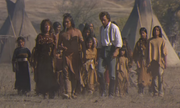
Dunbar walking with the tribe in their camp
Over the next three days, Dunbar helped the tribe with its buffalo hunting, losing half a dozen ponies and three men injured in the process. Dunbar concluded, "I've never known a people so eager to laugh, so devoted a family, so dedicated to each other, and the only word that came to mind was 'harmony'." Dunbar also wrote of his loneliness, and, that night, he danced around his campfire in the Indian way. Two days later, he wrote of how he missed the company of his new friends, and he decided to make an unannounced visit the next day. Along the way, "Two Socks" followed him, and Dunbar chased the wolf and told him to go home. He then went to the camp, and, by autumn, the tribe had granted him his own lodge, talking with him every day. At the same time, Kicking Bird was frustrated with him, as he always wanted to know if more white people were coming, and Dunbar claimed that more white people would pass through the country, and nothing more, although he admitted in his journal that he was speaking "half-truths", knowing that there would one day be too many.
Romance[]

Dunbar talking with Kicking Bird
That same night, Dunbar was asked to accompany the Lakota war party against the Pawnee, and, while Dunbar was reluctant, he could not bring himself to say no, as the Lakota were his friends, and the Pawnee had been hard on the Lakota. Kicking Bird and Stands with a Fist then entered Dunbar's tent, and Kicking Bird asked why Dunbar wanted to join the war party, as the Pawnee had done nothing to him. Dunbar explained (through Stands with a Fist) that the Pawnee were Sioux enemies, but Kicking Bird said that only Sioux warriors were to join the war party. Dunbar said that he had been a warrior longer than most of the young men in the war party, but Kicking Bird said that Sioux and white warriors were different. Kicking Bird then asked that Dunbar look after his family while he was gone, and Stands with a Fist explained that it was a great honor. Dunbar accepted, and Stands with a Fist told Dunbar that Kicking Bird thanked "Dances with Wolves" for coming. Dunbar asked what that meant, and Stands with a Fist explained that all of the people were calling him by that name because of his chasing of the wolf that one day.
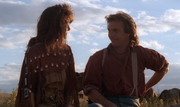
Dunbar bonding with Stands with a Fist
While the war party was away, Stands with a Fist taught Dunbar more of the Lakota language, having come to like "making the talk" (speaking English). Dunbar then asked Stands with a Fist how she came to join the tribe, and she explained that she was young when she joined the tribe, being made to work very hard. She explained that a woman in the tribe hated her and insulted her, as well as occasionally beating her. One day, she hit the woman, who fell hard on the ground, and she then asked if any other woman wanted to call her names; from this incident, she acquired her name. The two shared a few laughs before Dunbar asked why Stands with a Fist was not married, causing her to excuse herself, and Dunbar to apologize.

Dunbar talking to Stone Calf
Dunbar then approached Stone Calf about why Stands with a Fist was not married, speaking Lakota with him. Stone Calf explained that Stands with a Fist was in mourning, and, when Dunbar asked why, Stone Calf explained that she was crying for someone. Dunbar asked who she cried for, and Stone Calf revealed that it was rude to speak of the dead, but said that, because it was Dunbar's first time, he would tell him. He revealed that Stands with a Fist's husband had been killed not long ago, and that was the day on which Dunbar found her. Dunbar asked how long Stands with a Fist would be mourning, and Stone Calf said that Kicking Bird would decide when she was ready to marry again. Dunbar left that same morning, as he was secretly heartbroken; however, the tribe began to talk about the "medicine" Stands with a Fist was making with Dunbar, and Black Shawl later told Stands with a Fist of the talk, and that Dunbar had left that same morning.
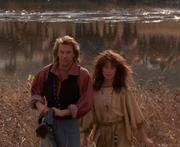
Dunbar walking with Stands with a Fist
That afternoon, Dunbar found Two Socks at the fort again, and, for the first time, he was able to get Two Socks to eat out of his hand, extending a strip of meat, which Two Socks eventually bit and ran off with after a moment of hesitation. That same afternoon, Dunbar found Stands with a Fist wading in a pond, and she then ran up to him, said "I am in mourning", and passionately kissed him, saying that nobody could know, and that they must be careful. That same night, Stands with a Fist came into Dunbar's tent and dropped her shawl, and they made love for the first time.
Fighting the Pawnee[]

Dunbar being congratulated after the battle
Their love was interrupted by the chattering of people in other tents, and, when Dunbar got dressed and went into the main tent, Stands with a Fist told him that the Pawnee were coming with a party of 40-50 men. The leaders of the tribe were panicked until Dunbar said that he had guns at the fort; while Chief Ten Bears said that they could not spare the men to retrieve the guns, Dunbar said that a gun would make each warrior like two. Dunbar went with Smiles a Lot to retrieve the guns, and, the next morning, he and the tribe repelled the Pawnee attack with repeater rifles. Dunbar watched as the Pawnee leader Sakuruta was surrounded and killed by the tribe, and he wrote in his journal that, for the first time, he fought not for a "dark political cause" or "to make men free", but to protect the lives of friends mere feet away. He lamented Stone Calf's death in battle, but recounted how even the old men could not remember such a one-sided victory in their own lifetimes. He also wrote that his old name fealt meaningless, while his Sioux name "Dances with Wolves", which the tribesmen chanted repeatedly after the battle, defined him.
Marriage[]

Dunbar talking with Wind in His Hair before the wedding
Not long after, Black Shawl persuaded her husband Kicking Bird to allow Stands with a Fist to end her mourning, and Kicking Bird agreed to let Dunbar marry her after hearing that everyone in the tribe supported the match. Wind in His Hair served as a "best man" of sorts, getting Dunbar ready for the wedding, and confiding in him that Stands with a Fist's late husband had been his best friend and a good man, and that it had initially been hard for him to like Dunbar. He confessed that he was not a thinker like Kicking Bird, and that he always felt anger first. However, he told Dunbar that he was now sure that Stands with a Fist's husband had "gone away" because he knew that Dunbar would come after him, profoundly touching Dunbar.
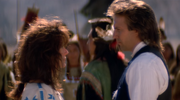
Dunbar and Stands with a Fist's wedding
Dunbar went on to marry Stands with a Fist in a public ceremony, and he confided in his journal that he was so lost in the details of his wife that he hardly paid attention to anything else going on around him. Kicking Bird asked if Dunbar had heard what he was saying (about the obligations of a Sioux husband), and Dunbar responded in English, "yes", upon which Kicking Bird told Dunbar that he could now take his wife inside his tent. Dunbar thanked the tribe, and he went to his tent with Stands with a Fist to consummate their marriage. Shortly after, while talking with Kicking Bird, he told him that they were already trying for a baby.
Warning Kicking Bird[]

Dunbar warning Kicking Bird about the whites
Some time later, Dunbar and Kicking Bird sat down for a deep conversation, as Dunbar told Kicking Bird that he always asked about the white people and how many more of them were coming. For the first time, Dunbar admitted that there would be many white people, more than could be counted. In English, Kicking Bird asked, "How many?", and Dunbar responded, "Like the stars." In Lakota, Dunbar said that this fact made him afraid for all the Sioux, and Kicking Bird told Dunbar that they should share the news with Ten Bears.

Ten Bears holding the Spanish helmet
That night, Dunbar sat in Ten Bears' tent, and Ten Bears showed Dunbar a conquistador helmet before saying, "The men who wore this came in the time of my grandfather's grandfather." He revealed that the Sioux eventually drove the Spanish out, that the Mexicans also didn't come to the region anymore, and that, in his own time, the Texans had met the same fate. Ten Bears said that the past peoples took without asking, and that he did not know if the Lakota were ready for the newcomers. Ten Bears lamented that Dunbar spoke true, and that the whites would keep coming, although he said that the country was all the Lakota had, and that they had to defend it. Ten Bears then decided that it would be wise for the tribe to move to its winter camp, and the tribe promptly packed up and moved.

Dunbar telling Stands with a Fist about his journal
As Stands with a Fist was packing up with Dunbar, she asked if he had everything from the "soldiers' fort", and Dunbar said that he did, and that there was nothing for him there. However, he realized that he had left his journal at the fort, and, despite Stands with a Fist's objections, he decided that he had to go back and retrieve it, as it contained his life's story, and the Army could use the journal to track down the tribe. Kicking Bird decided that he could not wait for Dunbar, and he embraced Stands with a Fist one last time before he rode off to grab the journal, promising, "I'll catch up; I'll catch up!"
Capture by the Army[]

Dunbar being captured
When Dunbar reached the cliff above the fort, he observed that the fort had been fully occupied by the Army, and a group of soldiers on a wagon began to yell, "Indian! Indian!" upon seeing the Lakota-dressed Dunbar overlooking the camp. The soldiers shot Cisco dead before running up to a distraught Dunbar and knocking him unconscious with a rifle butt. When Dunbar woke up, he was interrogated by Sergeant Lawrence Bauer, Lieutenant Charles Elgin, and Major Willard Grace, who asked if he spoke English, and what he was doing there. Dunbar identified himself, said that he had been posted to the fort from Fort Hayes in April 1863, and that his orders were in his journal, which was at the fort. However, Private Anthony Spivey said that they had found no journal; the Major promptly ordered Spivey to find the other man who had reached the fort first, Edwards. While the others were gone, Sergeant Bauer laughed at how Dunbar had "turned Injun".

Dunbar being interrogated
While Dunbar was being walked outside by an armed patrol, he stopped to look sorrowfully upon Cisco, whose body was being feasted upon by vultures, and, when a soldier butted him with his rifle, Dunbar got into a fight with the soldiers and was nearly knocked out. When he woke, he was again interrogated, and Major Grace asked why Dunbar was out of uniform. Dunbar in turn asked what the Army was doing there, but Bauer butted him and told him that the Lieutenant was asking the questions. Elgin reprimanded Bauer and said that the Army was in the region to apprehend hostiles who had taken white captives in recent raids, to which Dunbar responded that there were no hostiles. Grace said that the Army would ascertain that for themselves, and said that, if Dunbar could guide them to the Sioux camps and serve as an interpreter, his conduct would be re-evaluated. Dunbar asked what conduct he meant, and Grace said that his status as a "traitor" might improve if he was to work with the Army. Dunbar said, "There's nothing for you to do out here," and, when Grace angrily asked if Dunbar was willing to cooperate, Dunbar responded in Lakota, "I am Dances with Wolves. I have nothing to say to you. You are not worth talking to." Grace promptly walked out, and Elgin ordered Sergeant Bauer to assemble a detail, take Dunbar down to the river, and help him clean his face.

Dunbar in US captivity
As Dunbar washed his face as seven soldiers stood guard, Spivey relieved himself across the pond, using pages from Dunbar's journal as toilet paper. He was then taken back to the barracks, where he attacked Spivey after Spivey toyed with the apparently unconscious Dunbar's necklace. Sergeant Bauer restrained Spivey before he could retaliate, instead saying that Dunbar would be more hungry from then on, and also taunted him by saying that he was to be taken back to Fort Hays and hanged for treason. While being taken to Fort Hays in the wagon, Dunbar noticed that the soldiers were beginning to shoot at something in the distance, and, when he saw that they were shooting at Two Socks, he took Spivey down with his legs and attempted to choke him with his feet. Bauer responded by butting Dunbar's head with his rifle, and the soldiers proceeded to shoot Two Socks dead. Lieutenant Elgin then arrived and reprimanded the soldiers, threatening to shackle Spivey if he bashed Dunbar one more time, and forcing the soldiers who had run up to Two Socks to come back to the wagon.
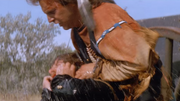
Dunbar drowning Spivey
As the wagon crossed a creek, however, it was ambushed by six Lakota warriors led by Wind in His Hair, and the Lakota killed Lieutenant Elgin with an arrow to the chest before attacking the others. Dunbar helped push several soldiers off the wagon to prevent them from shooting his friends, and he drowned Spivey in the river. After all seven Union soldiers were killed, Dunbar found his journal on Spivey's body, and he decided to throw it into the water to be lost to history.
Leaving the tribe[]

Dunbar arriving at the winter camp
Dunbar then followed his rescuers to the Lakota tribe's winter camp, where he was greeted by the tribe, and jumped from his horse to passionately kiss Stands with a Fist, the two of them falling to the ground. That night, he sat with Ten Bears and the other elders, and Ten Bears commented that Dunbar was quiet those days. Ten Bears asked if Dunbar's heart was "bad", and Dunbar responded by saying that, while killing the soldiers at the river was a good thing, they hated him now like they hated no other, as they thought he was a traitor. Dunbar concluded that the soldiers would look for him and, when they found him, they would find the tribe as well. Dunbar said that it would be wise to move the village immediately, and he announced that he would be leaving to talk to those who would listen.

Dunbar meeting with Ten Bears
After an outpouring of anger at Dunbar's decision, Ten Bears asked to speak with Dunbar alone. Ten Bears said that Dunbar was the only white man he had ever known, and that he thought about him very often. He then expressed his belief that Dunbar was wrong, as the man the soldiers were looking for no longer existed, and that there was now only a Sioux named "Dances with Wolves". He then offered to smoke with Dunbar for a while, and Dunbar pushed Ten Bears as far as he could to move the camp. Ten Bears responded by talking of simple pleasures, saying that, at his age, a good fire was better than anything.

Dunbar bidding farewell to Kicking Bird
The next morning, Dunbar packed his belongings and talked to Stands with a Fist, who was speechless about Dunbar's decision to leave. Stands with a Fist said that her place was with Dunbar, and she said that she was not afraid. Dunbar revealed that he had told Ten Bears that they would leave when the snow broke, although he had not yet told everyone. Dunbar left the knife he had been given by one of the Lakota in Kicking Bird's tent, and Kicking Bird went to see Dunbar one last time before he left. He asked if Dunbar had finished his pipe, and Dunbar handed it to Kicking Bird, who complimented the pipe. Kicking Bird asked how it smoked, and Dunbar explained that he had never smoked it. Kicking Bird then exchanged the pipe for the knife, and he commented, "We've come far, you and me." Dunbar told Kicking Bird that he would not forget him, and he then walked off. A tearful Smiles a Lot looked at him as he packed his horse and gave him a package before running off, and Dunbar unwrapped it to find his journal.

Dunbar and Stands with a Fist leaving the winter camp
As Dunbar and Stands with a Fist slowly rode out of the camp, Wind in His Hair rode up to a high cliffside on his horse and shouted, "Dances with Wolves! I am Wind in His Hair! Do you see that I am your friend? Can you see that I will always be your friend?" He and Stands with a Fist slowly and silently rode off as Wind in His Hair repeatedly shouted that he was Dunbar's friend, and, soon after they left, the rest of the tribe ultimately moved as well, leaving just in time to evade the pursuing US Army. Thirteen years later, their homes destroyed, their buffalo gone, the last band of free Sioux submitted to white authority at Fort Robinson, Nebraska. The great horse culture of the plains was gone, and the American frontier was soon to pass into history.

